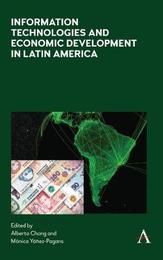
|
Information Technologies and Economic Development in Latin America
Hardback
Main Details
| Title |
Information Technologies and Economic Development in Latin America
|
| Authors and Contributors |
By (author) Alberto Chong
|
|
By (author) Monica Yanez-Pagans
|
| Physical Properties |
| Format:Hardback | | Pages:250 | | Dimensions(mm): Height 229,Width 153 |
|
| Category/Genre | Development economics |
|---|
| ISBN/Barcode |
9781785271991
|
| Classifications | Dewey:330.98 |
|---|
| Audience | | Professional & Vocational | |
|---|
|
Publishing Details |
| Publisher |
Anthem Press
|
| Imprint |
Anthem Press
|
| Publication Date |
29 February 2020 |
| Publication Country |
United Kingdom
|
Description
Study of the role of ICT on Latin American economic development Information Technologies in Latin America provides a collection of rigorous empirical studies that contributes to a better understanding of the role and impact of old and new information technologies on Latin American economic development through the use of randomized and quasi-experimental methods. Information Technologies in Latin America provides a collection of rigorous empirical studies that contributes to a better understanding of the role and impact of old and new information technologies on Latin American economic development. It provides evidence using randomized and quasi-experimental designed studies for different information and communication technologies interventions. In evaluating their development impact a critical concern has been to contribute to the little existing evidence. In fact, whereas many ICT projects in the developing world have been promoted by multilateral organizations, bilateral aid agencies and nongovernmental organizations in recent years, the extent to which these interventions and policies actually contribute to the development of the region is unclear. The book provides evidence on what works and what does not. Information and communication technologies have expanded dramatically in Latin America. During the last two decades, mobile phones have penetrated more quickly in this region than in developed regions at a remarkable rate. Similarly, the per capita growth rates of Internet users have been higher in developing countries than in developed countries. The really fast diffusion of newer technologies such as mobile telephony, broadband and Internet has opened up big opportunities for using these technologies in the delivery of information in businesses and social service providers in Latin America and the Caribbean. Information Technologies in Latin America provides a collection of rigorous empirical studies that contributes to a better understanding of the role and impact of old and new information technologies on Latin American economic development. It provides evidence using randomized and quasi-experimental designed studies for different ICT interventions. In evaluating their development impact a critical concern has been to contribute to the little existing evidence. In fact, whereas many ICT projects in the developing world have been promoted by multilateral organizations, bilateral aid agencies and nongovernmental organizations in recent years, the extent to which these interventions and policies actually contribute to the development of the region is unclear. The book provides evidence on what works and what does not. An important objective is to test one of the frustrating benefits of randomized controlled trials, namely, their ability to show that a program works when it does not and in fact, important policy lessons can be gained from failed field experiments. This collection of essays aims to provide valuable insight on both the promise and the pitfalls of trying to replace conventional, high cost outreach with technological alternatives. Thus, it may be relevant both to researchers working in the area of information technologies and development, as well as to practitioners pondering how to leverage technology to improve outreach and reach clients in innovative ways.
Author Biography
Alberto Chong is a professor of economics at Georgia State University, USA. Monica Yanez-Pagans is a senior economist at the World Bank, Washington, DC.
|